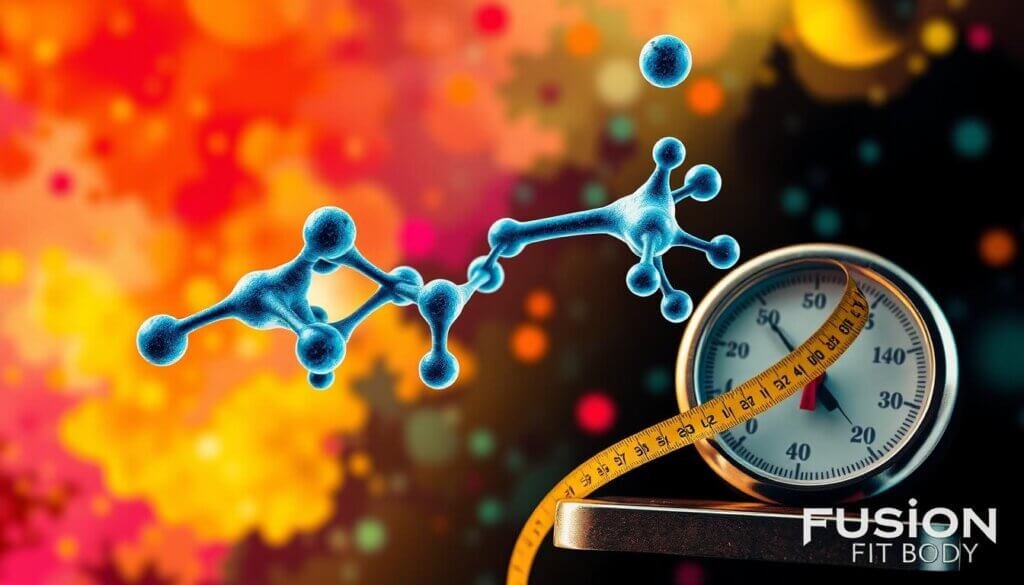Did you know the average American adult has gained over 30 pounds in the last 20 years? This is a shocking fact that shows how hard it is to manage weight today. But, could the secret to losing weight safely be in our hormones?

In this article, we’ll explore how hormones affect weight loss. We’ll see how the endocrine system controls our metabolism, hunger, and fat storage. We’ll also look at how different hormones can help or hinder our weight loss journey. By learning about these hormones, we can take a more complete approach to reaching our health and fitness goals.
Key Takeaways
- Hormones play a crucial role in regulating metabolism, appetite, and fat storage.
- The endocrine system is responsible for producing and balancing various hormones in the body.
- Key hormones that impact weight loss include insulin, cortisol, thyroid hormones, and leptin.
- Maintaining hormonal balance is essential for effective and sustainable weight management.
- Understanding the science behind hormones and weight loss can empower us to make more informed lifestyle choices.
Understanding the Basics of Hormonal Balance
Our bodies are intricate things—hormones not only contribute a lot of functions. That has covered the way we control our weight. Let’s go through how the endocrine system functions, and which hormones impact our weight.
The Role of the Endocrine System
The endocrine system consists of glands and organs that create hormones. These hormones were released into our blood and go around speaking to our body through our blood. This includes how we eat, and how we burn energy. Maintaining this system in balance is essential for keeping to a healthy weight.
Key Hormones That Regulate Body Weight
Leptin, ghrelin and thyroid hormones are three key weight-related hormones. Leptin signals to our brain to eat less and burn more energy. The hunger hormone: Ghrelin (which literally means “one that causes hunger”): Ghrelin makes you hungry and gain weight. Thyroid hormones play a role in how quickly we burn energy, and imbalances can influence our weight.
How Hormone Levels Change Throughout the Day
Hormone levels are not fixed all day, they respond to our environment and the actions of our bodies. For example, leptin increases at night to prevent us from overeating. What gives rise to the hunger after sleep,? Ghrelin Levels rising in the morning? Understanding these patterns can help us lose weight more effectively and make better food choices.
When we realize how hormones cooperate, we are beginning to understand the science of controlling excess weight. This knowledge can result in even more effective methods for maintaining our bodies balanced and healthy.
Hormones and Weight Loss: The Critical Connection
And hormones make a huge difference in the way we control our weight.” HORMONES ARE OUT OF BALANCE WHEN IT COMES TO LOSE WEIGHT. The problem here is insulin resistance — that is, our cells not responding well to insulin.
Being insulin resistant can make us fat, particularly in the abdominal region. That is because insulin regulates blood sugar, but also regulates fat storage. Our body produces more insulin when we have insulin resistance. This results in higher fat storage and losing weight is therefore more difficult.
To fight insulin resistance and help with weight loss, we can try a few things:
- Eat a balanced diet with lots of whole foods to keep insulin levels in check.
- Stay active with regular exercise to improve insulin sensitivity and burn fat.
- Manage stress well, as too much stress can raise cortisol levels and lead to weight gain.
- Get enough sleep, as not sleeping well can mess with our hormones and make losing weight harder.
By tackling the hormonal issues and taking a holistic approach, we can achieve lasting weight loss. Our hormones are key to managing our weight, and knowing how they work is the first step to success.

The Impact of Stress Hormones on Body Composition
Stress affects our health deeply. It impacts weight management, especially with stress hormones like cortisol. Knowing how cortisol and weight gain are linked is key to losing weight.
Cortisol's Effect on Fat Storage
Cortisol, known as the “stress hormone,” is crucial in our stress response. High stress raises cortisol, leading to fat storage, especially around the belly. This is because cortisol increases glucose in the blood, which turns into fat.
Managing Stress for Better Weight Control
To fight stress hormones’ weight impact, we need stress management. This includes:
- Regular exercise to reduce stress and boost endorphins
- Relaxation techniques like deep breathing, meditation, or yoga
- Self-care activities that bring joy and balance
- Support from friends, family, or mental health professionals
Sleep's Role in Hormonal Balance
Sleep is vital for hormonal balance. Good sleep helps control cortisol and supports metabolism. Aim for 7-9 hours of sleep each night for hormonal health and weight management.
HormoneImpact on WeightCortisolIncreased cortisol levels can lead to increased cortisol and weight gain by promoting fat storage, particularly in the abdominal area.InsulinHigh insulin levels can contribute to how hormones affect metabolism and promote the storage of excess calories as fat.Thyroid HormonesImbalances in thyroid hormones can significantly impact how hormones affect metabolism and influence weight management.

"Stress and high cortisol levels are often overlooked as contributors to weight gain, but they play a critical role in the body's ability to regulate metabolism and body composition."
Dr. Sarah Johnson, endocrinologist
Key Strategies for Hormonal Weight Management
So, we complied the evidence-based methods for optimally controlling the body weight through hormone modulation. They help balance the metabolic processes of your body. Whether its modifying your meals or tweaking your lifestyle, all of these pointers help in losing weight sustainably and being healthy.
Regulate Insulin Levels
Keeping insulin levels healthy is key for weight management. Here are some tips to regulate insulin resistance and aid in weight loss:
- Choose low-glycemic foods like whole grains, lean proteins, and non-starchy veggies to avoid blood sugar spikes.
- Try intermittent fasting to boost insulin sensitivity and fat burning.
- Consider supplements like chromium, berberine, or alpha-lipoic acid to improve insulin function.
Optimize Leptin Signaling
Leptin, which controls appetite and metabolism, can lose sensitivity over time. To boost leptin sensitivity and aid in weight loss:
- Eat a nutrient-dense, high-protein diet to reset leptin levels.
- Regular physical activity can increase leptin sensitivity.
- Manage stress levels, as chronic stress can harm leptin signaling.
By using these strategies, you can take a big step towards hormonal balance and reaching your weight goals.

The Role of Nutrition in Hormonal Balance
Nutrition is 80% of maintaining a healthy weight. The way we eat — it impacts our hormones, which helps us drop weight. Let’s examine how some foods and dietary patterns support our hormones to work as they should for weight-loss.
What is the purpose of the conversion of T4 to T3? Thyroid hormones are crucial for our metabolism and energy. Certain nutrients, including iodine, selenium and vitamin D, are necessary for our thyroid to function optimally. Eating iodine-rich foods, such as seaweed and dairy, helps support our thyroid.
Ghrelin, or the “hunger hormone,” tells us when to eat. What we eat affects ghrelin levels. Eating foods high in fiber, protein, and healthy fats helps keep our hunger in check.
Nutrient Role in Hormonal Balance Best Food Sources Iodine Supports healthy thyroid function Seaweed, eggs, dairy products Selenium Aids in the conversion of thyroid hormones Brazil nuts, tuna, turkey Vitamin D Helps regulate thyroid hormone production Fatty fish, egg yolks, fortified foods Fiber Helps regulate ghrelin and other appetite-related hormones Vegetables, fruits, whole grains, legumes Eating nutrient-rich foods and following a balanced diet supports our hormones. This helps our body manage weight naturally. Understanding nutrition’s role in hormonal health is crucial for lasting weight control.

Exercise and Its Impact on Hormonal Health
It’s not all about burning calories: exercise Scientists are much more than data come to October 2023 It has a great impact on our hormonal balance. Striking this balance is fundamental to how our bodies process fat.
Exercise alters levels of key hormones such as cortisol, insulin and testosterone. These hormones play an essential role in our metabolism and regulating weight. By understanding what exercise and hormones do to each other, we can formulate a workout plan that aligns with our health and weight achievement needs.
The Impact of Different Exercise Modalities
The effects of different types of workouts on hormone levels are not one-size-fits-all. Cortisol goes down with the aerobic exercise (define brisk walking or cycling)What aerobic exercise do? Aerobic exercise are the exercises that we do to decrease cortisol in the body and to increase insulin sensitivity. This helps with weight loss. Resistance training, by contrast, elevates testosterone, facilitating muscle-building and fat-burning.
- Aerobic exercise: Helps lower cortisol and improve insulin sensitivity
- Resistance training: Boosts testosterone production, building lean muscle
Mixing different types of exercise in your routine helps your hormones work together. This supports your weight loss and health goals.

“Exercise is not just about burning calories – it’s about creating a hormonal environment that supports weight management and overall wellbeing.”
Understanding the link between exercise and hormones lets us customize our workouts. This optimizes how hormones affect metabolism and leads to lasting hormones and weight loss results.
Conclusion
That’s what we’re going through in this article and how the hormones impact the weight loss. We only have to look at how the endocrine system regulates our metabolism, appetite and weight. But have you heard of hormones—cortisol, insulin, thyroid hormones, et al? The knowledge about managing these hormones leaves us better off with our weight.
Strategies such as stress management, adequate sleep, and nutrition can impact us in a way that helps us maintain an appropriate weight. Correcting hormonal imbalances can help improve the functioning of our bodies. Turning this into a permanent long term weight loss story.
Our hormones are involved in a complicated tango that requires a whole-body approach to balancing them. And utilizing what we learn can help us balance our hormones and lose weight—and keep it off! Together, we can achieve a better health and well-being through a hormonal balance.
Looking for more tips and insights? Explore our other articles in our Fitness blog!
FAQ
What is the connection between hormones and weight loss?
Hormones control our metabolism, appetite, and fat storage. Imbalances in hormones like leptin and ghrelin can affect weight loss. Knowing how hormones work is key to managing weight.
How do hormones affect metabolism?
Hormones directly affect our metabolic rate. Thyroid hormones help us burn calories. Insulin controls glucose and fat storage. Hormonal imbalances can change our metabolism, making weight loss harder or easier.
What is the role of leptin and ghrelin in weight loss?
Leptin and ghrelin control hunger. Leptin tells the brain we’re full. Ghrelin makes us hungry. A balance between them is vital for managing cravings and losing weight.
How does stress affect weight gain?
Stress raises cortisol levels, which harms weight management. Cortisol increases hunger and fat storage. Reducing stress is important for hormonal balance and weight control.
What are some dietary and lifestyle strategies for optimizing hormones for weight loss?
Eating a diet rich in whole foods helps balance blood sugar and insulin. Regular exercise, like strength training, balances hormones. Quality sleep and stress management also support healthy hormone levels and weight loss.

